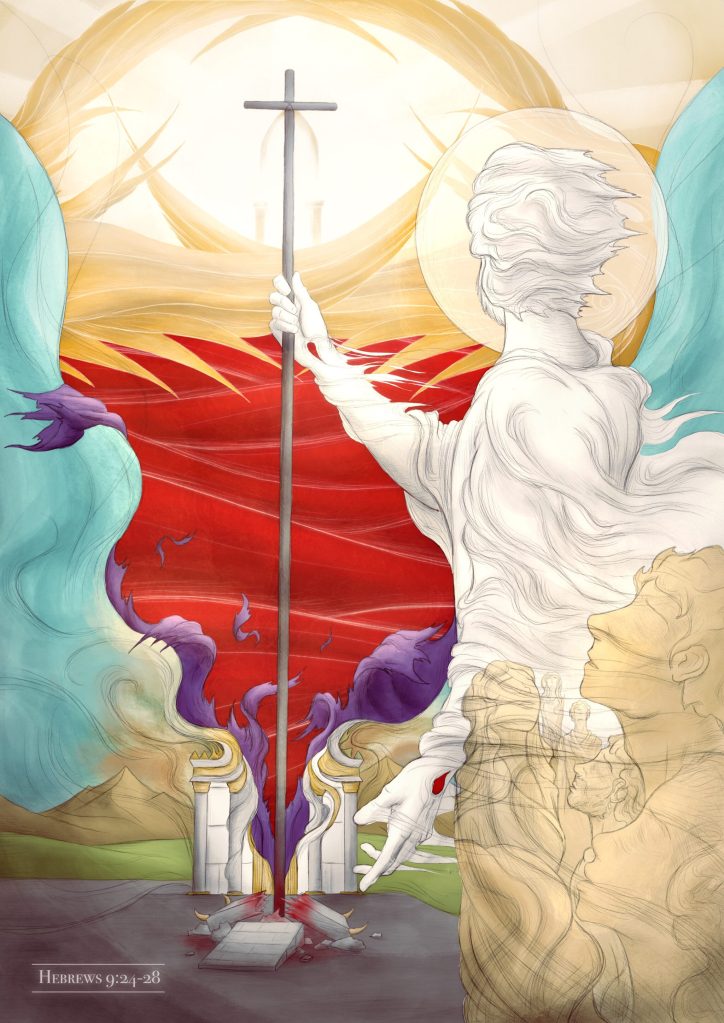
Revelation 7:9–17
9 After this I looked, and behold, a great multitude that no one could number, from every nation, from all tribes and peoples and languages, standing before the throne and before the Lamb, clothed in white robes, with palm branches in their hands, 10 and crying out with a loud voice, “Salvation belongs to our God who sits on the throne, and to the Lamb!” 11 And all the angels were standing around the throne and around the elders and the four living creatures, and they fell on their faces before the throne and worshiped God, 12 saying, “Amen! Blessing and glory and wisdom and thanksgiving and honor and power and might be to our God forever and ever! Amen.”
13 Then one of the elders addressed me, saying, “Who are these, clothed in white robes, and from where have they come?” 14 I said to him, “Sir, you know.” And he said to me, “These are the ones coming out of the great tribulation. They have washed their robes and made them white in the blood of the Lamb.
15 “Therefore they are before the throne of God,
and serve him day and night in his temple;
and he who sits on the throne will shelter them with his presence.
16 They shall hunger no more, neither thirst anymore;
the sun shall not strike them,
nor any scorching heat.
17 For the Lamb in the midst of the throne will be their shepherd,
and he will guide them to springs of living water,
and God will wipe away every tear from their eyes.”
In the name of Jesus. Amen.
Dear saints of God. Has anyone ever shown you a photo and said, “That’s a picture of me when I was younger”? The snarky, obvious reply would be, “Isn’t every picture of you a picture of when you were younger?” It doesn’t matter if the picture is almost immediately available on the screen of your phone or if the picture has been sitting in some dusty photo album for years. They’re all a picture of you when you were younger.
Photos are a great way to preserve memories and pass along the stories of our lives and the lives of our loved ones. Even though those pictures captured just one moment in time, they remind us of so much more than the fraction of a second that it took for the shutter to open and close. They are a window into the lives of people in them, some of whom are no longer with us. Those pictures of the past have tremendous value.
When you take the time to look at old photos with family, you learn more about the people you love and can connect with them in a deeper way. You might find out that your quiet, tough, deer-hunting grandpa played the clarinet his freshman year of high school. You get the opportunity to tell your kids about the time you visited Mt. Rushmore as a kid just like they did. But when you went in 3rd grade, Aunt Jane got carsick on the drive up there. Two years ago at Thanksgiving, I learned that a pastor friend of mine has an uncle who was a groomsman for my father-in-law. Without looking through a photo album, I never would have known that my family was already tied to his.
With Thanksgiving coming up, I’d encourage you to do this. I know some of you kids might think it’ll be boring, but maybe you can make a game of it. See if grandma says, “That’s a picture of me when I was younger.” Just don’t make fun of her if she does.
In our text today we get to see an old picture, nearly 2,000 years old. But it is still a vivid, vibrant picture. It’s especially magnificent and spectacular because, even though it’s an old picture, it’s a picture of you in the future. The Apostle John sees the entire church – every Christian being welcomed into God’s presence. It’s a picture of the Church triumphant.
Now, before we look at the details of this picture, something needs to be crystal clear. This is not something in a galaxy far, far away. Nope! What is contained in this picture is right here and all around us. Hebrews 12:22-24a says that when you are here at church, “[Y]ou have come to Mount Zion and to the city of the living God, the heavenly Jerusalem, and to innumerable angels in festal gathering, and to the assembly of the firstborn who are enrolled in heaven, and to God, the Judge of all, and to the spirits of the righteous made perfect, and to Jesus, the mediator of a new covenant.” Can you see it? No. But does that mean it is any less real? Not at all!
Now, to the picture. The major details of the picture are a great multitude – more than anyone could count. People from every nation, tribe, and language. They stand before the Lamb who is on the throne. They wear white robes, wave palm branches, and sing, “Salvation belongs to our God who sits on the throne and to the Lamb.” That’s what you see with a quick glance at the picture.
Next, our text gives the caption that’s under the picture which lets us know the identity of this multitude. One of the elders asks John, “Who are these people clothed in white robes, and from where have they come?” Maybe John could have mustered up a good guess. Already in Revelation, John has seen a lot of awesome, amazing, wonderful things. But he’d rather hear the elder say who they are, so he punts the question back to him, “Sir, you know.” And the elder gives the caption, “These are the ones coming out of the great tribulation.”
Now, that’s a good, accurate translation so long as we see that this is a present, ongoing thing – a continual process. To get the idea gets across, it could be translated, “These are the ones who are coming out of the great tribulation.” In other words, this already massive crowd keeps growing bigger and bigger all the time as believers leave this life and enter the next, and they are leaving the great tribulation.
Now, there are some very smart Christians who disagree with me on this, but because of how Scripture uses the word for ‘tribulation,’ I do not think this is some future thing. In the opening verses of Revelation, John writes that he is our brother and partner of the tribulation and the kingdom (Rev. 1:9). Jesus, in Jn. 16:33, says, “In this world you have tribulation.” The word for ‘tribulation’ is θλῖψις (thlipsis) and it can be translated tribulation, affliction, trouble, and suffering. Different translations will tend to favor using one of those words more often than others. But when you look at all the different places the word is used, you can see that it is a description of our life in this broken, fallen world. It is to be in this veil of tears. The people in this picture John puts before us are coming out of this tribulation.
If you look back at the previous chapter (Rev. 6), you see that this multitude has come out of war, famine, sickness, economic hardship, persecution, and political turmoil. But now they are standing before the Lamb and singing His praise. What this means is that all the believers we love but have died, they are still singing God’s praise. They are all there in the great host. They made it.
They’re holding the palm branches, singing the songs, standing in the presence of Jesus, the Lamb who shed His blood and was slaughtered to forgive them all of their sins. Jesus, the Lamb who died and rose again is now their Shepherd. All of them are in this picture because they are the saints who have gone before us. God be praised.
But, dear saints, remember that this is All Saints’ Sunday. You are part of that host too. You are also coming out of the great tribulation. Yes, you’re still in it, but you are in the process of coming out of it as you hold to faith in Christ. It is a picture of you when you are older, and because you have this picture, your life in this great tribulation becomes a little more bearable.
The troubles and trials of this world that leave your robes tattered, torn, stained, and defiled, they will all be plunged into the blood of the Lamb and come out dazzling white. The afflictions and persecutions you endure now will go away because you will be sheltered by and in His presence. You know that your hunger and thirst for peace and security will be satisfied. The tribulations that make your pillow wet with tears, they will all be wiped away.
Yes, you, dear saint, are part of this endless, uncountable crowd, but you aren’t lost in the host. For you, for each and every one of you, God will wipe away every last tear. The whole host is there. Not one is missing. Yet, every individual is intimately cared for by the Lamb.
This is true because Jesus, your Savior, has come and made you His saint. He has and will make everything sad come untrue. Everything that has been broken because of sin will be all the more beautiful because it has been redeemed and made new by the blood of Christ.
You, believer, are part of that host. Come quickly, Lord Jesus. Amen.
The peace of God, which surpasses all understanding, will guard your hearts and minds in Christ Jesus. Amen.





You must be logged in to post a comment.